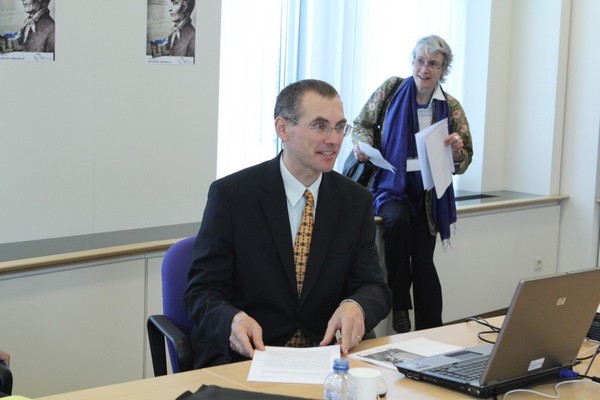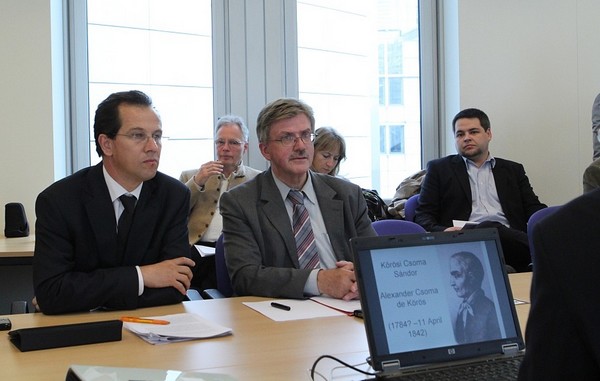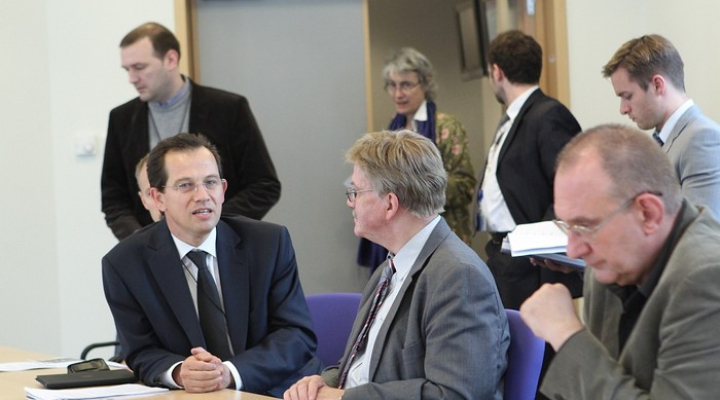The spiritual link between Tibet and Europe is based on Sándor Kőrösi Csoma’s work
The European Parliament’s “Tibet” intergroup held its 90th meeting on the 24th of April. On this occasion, DAHR’s MEP Csaba Sógor, who is an active member of the intergroup, organized a commemoration of the 170th anniversary of the death of Sándor Kőrösi Csoma in order to promote the cultural heritage of the Hungarian community in Transylvania.
On Csaba Sógor’s invitation, India specialist and Oxford professor Dr. Imra Bangha held a presentation entitled Bridges between Tibet and Europe. The professor also works as the director of the "Kőrösi Csoma Sándor" Institute of the Sapientia University in Miercurea Ciuc.
Imre Bangha focused on the universality of Sándor Kőrösi Csoma’s work highlighting its aspects that are relevant even today. He praised Csoma’s work in the field of traditional languages and cultures, as well as his contribution to the establishment of the global learning method, emphasizing that all over the world Csoma is known as the founder of tibetology: the world came to know Tibetan Buddhism through his writings.
Imre Bangha focused on the universality of Sándor Kőrösi Csoma’s work highlighting its aspects that are relevant even today. He praised Csoma’s work in the field of traditional languages and cultures, as well as his contribution to the establishment of the global learning method, emphasizing that all over the world Csoma is known as the founder of tibetology: the world came to know Tibetan Buddhism through his writings.

He also recorded the grammar of the Tibetan language and developed a method of researching traditional cultures that was based on respect. For Hungarian speakers, Csoma represents travel, learning, research and persistence. The professor also spoke about Csoma’s British connections, his lifestyle based on perpetual learning and presented Csoma’s travels in the political context of the era.
Csaba Sógor, speaking as the guest of the event, thanked professor Bangha for his contribution and reminded the participants about the present-day relevance of Csoma’s work in the context of the spiritual link between Tibet and Europe.
- Respect for the Tibetan minority culture is still important for the traditional minorities, Europe and the entire world – concluded the Hungarian MEP from Transylvania. The EU is under scrutiny in this respect – he continued – because it can only be effective in its strive to protect the Tibetan culture if it can guarantee the preservation of the rights and cultures of traditional national minorities living within its borders.
Csaba Sógor, speaking as the guest of the event, thanked professor Bangha for his contribution and reminded the participants about the present-day relevance of Csoma’s work in the context of the spiritual link between Tibet and Europe.
- Respect for the Tibetan minority culture is still important for the traditional minorities, Europe and the entire world – concluded the Hungarian MEP from Transylvania. The EU is under scrutiny in this respect – he continued – because it can only be effective in its strive to protect the Tibetan culture if it can guarantee the preservation of the rights and cultures of traditional national minorities living within its borders.

The event’s target audience consisted of MEPs s interested in the issue of Tibet and their colleagues. Due to its special nature, the event was open for the general public as well.
Due to the interest shown towards professor Bangha’s presentation, Csaba Sógor invited him to Transylvania this fall to repeat the presentation at the European Discussion Nights, a series of debates organized by the MEP. The transcript of the presentation will be available on Csaba Sógor’s website soon.
Dr. Imre Bangha's presentation can be downloaded here.











